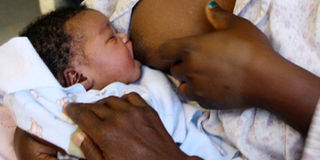Healthy eating tips for breastfeeding mothers

Breast milk contains everything a baby requires for proper development during the first six months of life. If your diet does not provide sufficient amounts of nutrients, it can affect both the quality of your breast milk and your health.
What you need to know:
- You do not need to eat special foods while breastfeeding. Follow a balanced diet, which is a combination of healthy foods
Every breastfeeding mother has questions regarding what to eat or avoid in order to produce and provide the required quantity of breast milk.
Amanda Tumwebaze, a nutritionist, says while there are no restrictions on any food or vegetables being consumed by a nursing mother, there are certain food items that can increase milk production. Eating enough carbohydrates, proteins, and vitamins is important.
Jane Nsokwa struggled to increase her breast milk supply when she had her first child. She was advised to take things such as porridge and eat all the time, which caused her to gain a lot of weight.
“After two months, I had gained so much weight but my breast milk supply was still low. I visited a nutritionist who instead advised me to eat a balanced but healthy diet. Within a short time, the results were visible,” she says.
Tumwebaze says, “Eating a balanced diet is a recommendation for all lactating mothers so that the breast milk is of good quality, benefiting the child in terms of nutrients density.”
Fruits and vegetables
Tumwebaze says avocado is a naturally good food to eat when breastfeeding. This is because it contains fibre, folate, and protein and helps increase the absorption of fat-soluble nutrients such as vitamins A, D, K, and E. Healthy fats from avocado can also improve your baby’s brain health.”
Green leafy vegetables are very essential in the production of breast milk. Full of iron, spinach is a useful vegetable to add as a side dish to any dinner and may aid in seeing a rise in your milk supply.
Carrots especially are filled with beta-carotene which is an important nutrient for both the mother and the newly born baby. “The beta-carotene nutrient is converted into vitamin A in the body, which is important for vision and eye health, immunity, and skin elasticity. It easily passes through your breast milk to your baby to boast their immunity,” tumwebaze says.
Eggs
It is recommended that breastfeeding mothers eat eggs because they are a complete protein that is filled with all the amino acids you and your baby need. Nsokwa was advised to eat, especially boiled eggs since they increase a mother’s intake of choline, an essential nutrient that helps your health as well as the baby’s brain development.
Plenty of fluids
It is important to drink plenty of fluids each day since this is one way of increasing your quantity of breast milk. If a mother is dehydrated, then she will not produce enough breast milk.
Tumwebaze says, “Eat silver fish, oats, mushroom, offals and katunkuma. Remember that food for lactating mothers should have less spices and salt.”
Beans and legumes
Dr Denis Katanku Musoga, a nutritionist at the Uganda Heart Institute, says beans are good for you and your baby because they contain fibre, protein, iron, folate, zinc, and calcium.
Adding them to your diet will not only help increase your plant-based proteins, but also help keep your bowel movements regular.
“The iron helps your body deliver oxygen to your cells to keep your energy high and reduce your risk of anaemia. Legumes aid in lactation and fenugreek has a powerful effect on breast milk supply,” says Dr Katanku.




